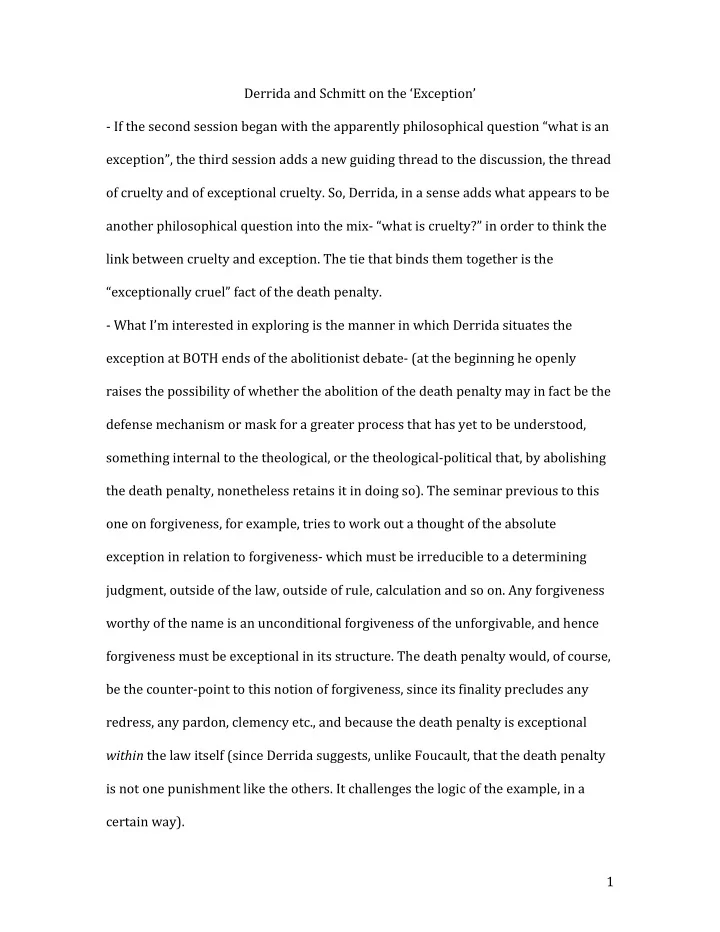

Derrida ¡and ¡Schmitt ¡on ¡the ¡‘Exception’ ¡ ¡ -‑ ¡If ¡the ¡second ¡session ¡began ¡with ¡the ¡apparently ¡philosophical ¡question ¡“what ¡is ¡an ¡ exception”, ¡the ¡third ¡session ¡adds ¡a ¡new ¡guiding ¡thread ¡to ¡the ¡discussion, ¡the ¡thread ¡ of ¡cruelty ¡and ¡of ¡exceptional ¡cruelty. ¡So, ¡Derrida, ¡in ¡a ¡sense ¡adds ¡what ¡appears ¡to ¡be ¡ another ¡philosophical ¡question ¡into ¡the ¡mix-‑ ¡“what ¡is ¡cruelty?” ¡in ¡order ¡to ¡think ¡the ¡ link ¡between ¡cruelty ¡and ¡exception. ¡The ¡tie ¡that ¡binds ¡them ¡together ¡is ¡the ¡ “exceptionally ¡cruel” ¡fact ¡of ¡the ¡death ¡penalty. ¡ -‑ ¡What ¡I’m ¡interested ¡in ¡exploring ¡is ¡the ¡manner ¡in ¡which ¡Derrida ¡situates ¡the ¡ exception ¡at ¡BOTH ¡ends ¡of ¡the ¡abolitionist ¡debate-‑ ¡(at ¡the ¡beginning ¡he ¡openly ¡ raises ¡the ¡possibility ¡of ¡whether ¡the ¡abolition ¡of ¡the ¡death ¡penalty ¡may ¡in ¡fact ¡be ¡the ¡ defense ¡mechanism ¡or ¡mask ¡for ¡a ¡greater ¡process ¡that ¡has ¡yet ¡to ¡be ¡understood, ¡ something ¡internal ¡to ¡the ¡theological, ¡or ¡the ¡theological-‑political ¡that, ¡by ¡abolishing ¡ the ¡death ¡penalty, ¡nonetheless ¡retains ¡it ¡in ¡doing ¡so). ¡The ¡seminar ¡previous ¡to ¡this ¡ one ¡on ¡forgiveness, ¡for ¡example, ¡tries ¡to ¡work ¡out ¡a ¡thought ¡of ¡the ¡absolute ¡ exception ¡in ¡relation ¡to ¡forgiveness-‑ ¡which ¡must ¡be ¡irreducible ¡to ¡a ¡determining ¡ judgment, ¡outside ¡of ¡the ¡law, ¡outside ¡of ¡rule, ¡calculation ¡and ¡so ¡on. ¡Any ¡forgiveness ¡ worthy ¡of ¡the ¡name ¡is ¡an ¡unconditional ¡forgiveness ¡of ¡the ¡unforgivable, ¡and ¡hence ¡ forgiveness ¡must ¡be ¡exceptional ¡in ¡its ¡structure. ¡The ¡death ¡penalty ¡would, ¡of ¡course, ¡ be ¡the ¡counter-‑point ¡to ¡this ¡notion ¡of ¡forgiveness, ¡since ¡its ¡finality ¡precludes ¡any ¡ redress, ¡any ¡pardon, ¡clemency ¡etc., ¡and ¡because ¡the ¡death ¡penalty ¡is ¡exceptional ¡ within ¡the ¡law ¡itself ¡(since ¡Derrida ¡suggests, ¡unlike ¡Foucault, ¡that ¡the ¡death ¡penalty ¡ is ¡not ¡one ¡punishment ¡like ¡the ¡others. ¡It ¡challenges ¡the ¡logic ¡of ¡the ¡example, ¡in ¡a ¡ certain ¡way). ¡ ¡ 1 ¡
-‑So, ¡curiously, ¡the ¡exception ¡finds ¡itself ¡on ¡both ¡sides ¡of ¡the ¡law, ¡as ¡it ¡were: ¡as ¡the ¡ exception ¡ to ¡the ¡law, ¡and ¡as ¡the ¡exception ¡ within ¡the ¡law, ¡on ¡this ¡side ¡of ¡the ¡law, ¡in ¡ the ¡death ¡penalty. ¡The ¡exception ¡is ¡something ¡like ¡a ¡limit ¡concept ¡(‘concept-‑limite’ ¡ p.89 ¡of ¡the ¡French); ¡if ¡there ¡is ¡no ¡ concept ¡of ¡the ¡exception, ¡no ¡law ¡of ¡the ¡exception, ¡ no ¡general ¡criterion ¡and ¡so ¡on, ¡this ¡is ¡because ¡the ¡exception ¡is ¡“by ¡definition” ¡ neither ¡inside ¡nor ¡outside ¡the ¡law ¡that ¡would ¡take ¡it ¡as ¡its ¡object. ¡What ¡Derrida ¡will ¡ move ¡towards ¡in ¡this ¡seminar ¡is ¡the ¡question ¡not ¡of ¡a ¡different ¡thought ¡or ¡logic ¡of ¡ the ¡exception, ¡but ¡a ¡different ¡ relation ¡to ¡the ¡question ¡of ¡exceptionality ¡as ¡such. ¡How? ¡ -‑ ¡ ¡Earlier, ¡while ¡noting ¡that ¡the ¡abolition ¡of ¡the ¡death ¡penalty ¡can ¡only ¡be ¡ accompanied ¡by ¡limitations ¡on ¡national ¡sovereignty ¡ ¡(thanks ¡to ¡trans-‑national ¡ pressure) ¡Derrida ¡remarks ¡that ¡the ¡death ¡penalty ¡remains, ¡in ¡all ¡of ¡the ¡various ¡ international ¡declarations ¡that ¡have ¡been ¡signed ¡since ¡1948, ¡the ¡main ¡exception ¡to ¡ the ¡“right ¡to ¡life,” ¡and ¡that ¡this ¡exception ¡is ¡(as ¡he ¡says ¡a ¡number ¡of ¡times) ¡ hypocritical. ¡In ¡fact, ¡it ¡constitutes ¡a ¡détente ¡in ¡a ¡sense ¡within ¡the ¡traditions ¡of ¡right ¡ and ¡natural ¡law. ¡However, ¡he ¡goes ¡on ¡to ¡say ¡at ¡this ¡point ¡that ¡he ¡will ¡leave ¡in ¡reserve ¡ (p.87 ¡of ¡the ¡French) ¡the ¡question ¡of ¡the ¡definition ¡of ¡the ¡exception, ¡the ¡state ¡of ¡ exception ¡and ¡so ¡on. ¡ ¡ -‑ ¡What ¡he ¡then ¡proceeds ¡to ¡do ¡is ¡to ¡multiply ¡exceptions ¡on ¡both ¡sides ¡of ¡the ¡limit-‑ concept ¡of ¡the ¡death ¡penalty, ¡from ¡Schmitt’s ¡theory ¡of ¡the ¡partisan, ¡to ¡Algeria ¡and ¡so ¡ on, ¡not ¡in ¡order ¡to ¡suggest ¡some ¡kind ¡of ¡dispersal ¡of ¡the ¡exception, ¡but ¡to ¡show ¡the ¡ way ¡in ¡which ¡the ¡exception ¡grounds ¡the ¡law ¡itself ¡by ¡defining ¡when ¡the ¡state ¡of ¡war ¡ exists, ¡when ¡it ¡is ¡legal ¡and ¡illegal ¡to ¡kill, ¡and ¡so ¡on. ¡ ¡ 2 ¡
-‑It ¡is ¡here ¡that ¡he ¡turns ¡to ¡Schmitt ¡and ¡the ¡question ¡of ¡translation ¡insofar ¡as ¡it ¡helps ¡ to ¡clarify ¡the ¡relation ¡between ¡law ¡and ¡exception. ¡In ¡fact, ¡he ¡will ¡go ¡on ¡to ¡articulate ¡ how ¡the ¡exception ¡grounds ¡sovereignty ¡itself-‑ ¡the ¡sovereign ¡lives ¡in ¡and ¡on ¡the ¡ exception ¡in ¡a ¡certain ¡way. ¡It ¡is ¡structured, ¡as ¡Schmitt ¡argues, ¡by ¡a ¡relation ¡to ¡the ¡ exception ¡because ¡the ¡sovereign ¡is ¡“He ¡who ¡decides ¡on ¡the ¡exception” ¡(which ¡is ¡a ¡ translation ¡of ¡“Souvran ¡ist, ¡wer ¡über ¡den ¡Ausnahmendzustand ¡entscheidet”). ¡How ¡ does ¡this ¡sentence ¡describe ¡the ¡ relation ¡ between ¡sovereignty ¡and ¡exception? ¡The ¡ sentence ¡does ¡not ¡mean ¡only ¡that ¡the ¡sovereign ¡locates ¡all ¡political ¡power ¡within ¡ himself ¡in ¡an ¡exceptional ¡situation ¡(a ¡state ¡of ¡war, ¡for ¡example) ¡in ¡order ¡to ¡protect ¡ the ¡state, ¡but ¡that ¡the ¡sovereign ¡is ¡instead ¡determined ¡ by ¡the ¡exception: ¡the ¡ sovereign ¡decides ¡the ¡exception ¡by ¡determining ¡when ¡the ¡exception ¡takes ¡place: ¡ (“Car ¡la ¡souveraineté ¡de ¡l’Etat ¡se ¡marque ¡justement ¡à ¡ce ¡pouvoir ¡de ¡décider, ¡de ¡ juger, ¡d’arrêter, ¡d’interpréter ¡librement ¡souvrainement ¡ce ¡qui ¡est ¡exceptionnel, ¡ce ¡ qu’est ¡l’exception. ¡La ¡souveraineté, ¡c’est ¡le ¡droit, ¡le ¡pouvoir ¡habilité ¡à ¡décider ¡de ¡ce ¡ qui ¡est ¡l’exceptionnel ¡de ¡l’exception. ¡La ¡souveraineté ¡est ¡l’exception ¡absolue, ¡le ¡droit ¡ de ¡se ¡donner ¡le ¡droit ¡à ¡l’exception ¡et ¡à ¡juger, ¡à ¡décider ¡arbitrairement, ¡ souverainement, ¡de ¡l’exceptionalité” ¡(p.89 ¡in ¡the ¡French)). ¡ The ¡proper ¡translation ¡of ¡the ¡“über” ¡is ¡significant ¡in ¡Derrida’s ¡reading ¡because ¡it ¡ constitutes ¡a ¡decision ¡regarding ¡the ¡relationship ¡between ¡sovereignty ¡and ¡ exception. ¡In ¡the ¡first ¡sense ¡(the ¡sovereign ¡as ¡he ¡who ¡decides ¡ in ¡an ¡exceptional ¡ circumstance ¡that ¡already ¡exists), ¡the ¡sovereign ¡emerges ¡in ¡a ¡context ¡in ¡which ¡the ¡ exception ¡is ¡“outside” ¡his ¡jurisdiction, ¡where ¡the ¡relationship ¡the ¡sovereign ¡has ¡to ¡ the ¡exception ¡is ¡distinct ¡from ¡his ¡sovereignty. ¡If, ¡however, ¡the ¡sovereign ¡is ¡the ¡one ¡ ¡ 3 ¡
Recommend
More recommend